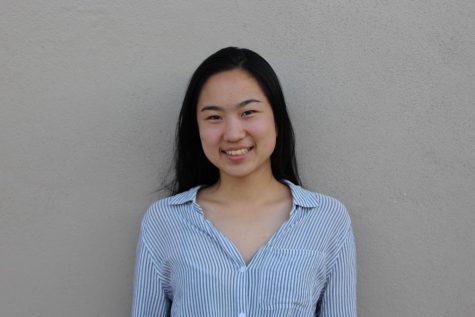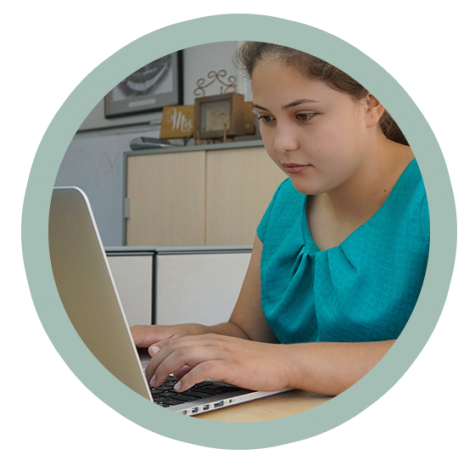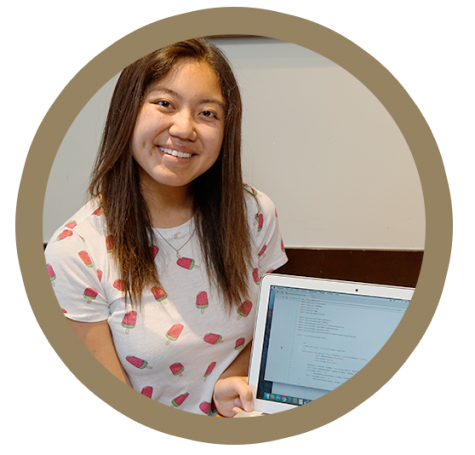
5'4". Black hair. Actually a lizard. When she think's no one's watching, spends time calling dogs pretty, watches videos about garlic bread in space...


August 14, 2017
Los Altos students have done it all: researching malaria in Ghana, designing biotech applications for a world-renowned university and working with the Mountain View Chamber of Commerce to help high schoolers. Through summer internships as varied as the students themselves, students have grown not only through the skills they’ve learned, but through the coming of age experiences common with internships. Most of all, their experiences now have taught them what they want, and in some cases, don’t want to do in the future. Whether it be to add a line to their resume or to get early experience, The Talon explores the varied experiences and impact that internships have had on Los Altos students’ lives.
After years of internships, Esmeralda Nuñez is entering her final year of high school knowing exactly which career she wants to pursue.
Esmeralda’s exposure to internships began in part due to her participation in Peninsula Bridge, a program to support middle and high school students in graduating high school and enrolling in college. Through the program, she found her first internship at a biotechnology lab at Arcus Biosciences the summer after her sophomore year.
“I wasn’t sure what I wanted to pursue as a career, so I wanted to just try out as many things as I could from various fields,” Esmeralda said. “I love doing labs in science class, so I thought it would be fun.”
Yet she soon realized that working in the field of biotechnology was not a career she would enjoy.
“I’m a tactic learner,” Esmeralda said. “To be a chemist or a biology major, it’s…lots of research, or at least that was the case at the company I interned for.”
Another way Esmeralda searched for internships was through AVID at Los Altos. After three years of tutoring for AVID, Esmeralda discovered her love for teaching students. However, she was still unsure about the class size and age group she wished to teach. After searching through available internships, Esmeralda found an internship that would allow her to explore the field of education: a teaching position at Stretch to Kindergarten.
This program aims to help rising kindergarten students and their parents have a smooth transition to kindergarten. As a teacher’s assistant, Esmeralda helped design games through which kindergartene
rs would learn their letters and numbers.
“It isn’t just about games, but it’s about how we can make learning fun,” Esmeralda said. “I tried out different games with the different kids and I actually enjoyed it, and I was like, ‘Maybe this is what I want to do.’”
Between Peninsula Bay and AVID, Es

meralda had the resources to find internships early on in her high school career. However, she remembers being one of the only students who received an offer to do an intern
ship her freshman year. Through talking to younger AVID students searching through the same company information she did, she realized that there continues to be a scarcity of underclassmen internship opportunities.
To help remedy this shortage of internships, during her spring break Esmeralda worked with a team of interns at the Mountain View Chamber of Commerce to assemble a website where AVID students seeking internships could find the contact information of businesses interested in hosting interns.
Esmeralda hopes the platform will open up the availability of internships to underclassmen, who are often turned down in favor of junior and senior applicants by making possibly unknown internships more accessible. Through her own internships, Esmeralda sees how beneficial getting an early start in gaining work experience can be.
“If you can get involved in something freshman year, when people ask the question ‘What do you want to be?’ it won’t be that hard because you have experience,” Esmeralda said. “If you only have junior and senior year to gain experience, you won’t have as many open doors.”
Four years ago, a former intern from Vuclip decided to drop out of the University of Michigan and start a company. With a small investment from Vuclip’s CEO, Nickhil Jakatdar, the student now runs a successful business.
For interns in the Silicon Valley, this is the ideal result of a summer internship. But high schoolers’ experiences are as varied as the companies they work at. For two companies, Vuclip and Sokikom, high school interns contribute to their companies in drastically different ways.
According to the Sokikom’s Director of Teacher Happiness Jose Magana, interns at the educational technology company, do what is stereotypically expected of an internship experience, helping the company with “basic and entry-level” tasks such as entering data or testing products.
On the other hand, at Vuclip, a mobile video service, interns work individually for a two-month period on projects assigned by a mentor at the company rather than working for Vuclip in the conventional sense.
“We try to give [interns] a very specific practical problem that they can solve from beginning to end,” Jakatdar said. “We had a high school intern who was interested in marketing, and we said ‘Figure out a way to build a user base of 1000 teenagers.’ By the end of the summer, he had about 1200 teenagers sign-up for his service.”
At the end of the summer, Vuclip interns present their project and lessons learned to their peers and parents. The Vuclip internship is designed as solely a learning experience instead of a typical work-based internship in which interns do various tasks, such as data entry, for the company.
“In two months we don’t believe the intern can learn so much about the company to contribute [to the organization] in a meaningful way,” Jakatdar said. “I view [internships] as a way to serves [students] in the long-term.”
Sokikom also looks to make the internship a learning experience. Instead of educating through projects, however, Sokikom hopes interns gain important work experience on the job.
“When they get to their first career they’ll definitely have an advantage because they don’t have to learn those basic things that other people have to [spend time on],” Magana said.
Along with work experience, Sokikom hopes their interns will get a well-rounded experience in all sectors of tech, from marketing to customer support. Like Sokikom, Vuclip believes that interns benefit the most when they learn lessons in various fields from computer science to marketing, as all projects requiring skills in all fields.
While Sokikom provides more work experience and Vuclip helps their interns critically think, both companies look to prepare their interns for the future.
College counselors, parents and that one relative that won’t stop asking you what you got on the SAT might tell you that internships offer valuable work experience in your field of interest, that they look good on a resume. In many cases, both of the above are true, but in my humble opinion, the true value of an internship lies in the more generalizable life lessons.
See, I’ve had two very different but equally fulfilling internship experiences, at a biostatistics lab at Stanford and then at the Noguchi Memorial Institute for Medical Research in Ghana. I’ve learned to sit at a lab bench without wreaking havoc, and I’ve become fascinated by biology, sure, but my most important takeaways have been non-academic.
Interning at Stanford during the summer before junior year taught me to be okay with having the lowest IQ in the room; the only other intern was a sophomore at Berkeley. She was working on an image recognition algorithm using convolutional neural networks. I was learning to open an Eppendorf tube with one hand.
I became more comfortable in my own company — driving myself to and from the internship each day to the tune of hackneyed radio pop, eating prepackaged Costco salad alone in a rooftop garden or wandering aimlessly through the Cantor museum.
And in a fortuitous plot twist, I became fascinated by the rapidly developing field of genomics.
I’d taken the internship at the genomics lab because it was the most appealing resume fodder I’d had access to at the time, but in the end, it was more than worthwhile.
The following summer, before my senior year, I was rejected from all of the research summer programs I applied to.
Disheartened and desperately seeking any research-related activity to occupy my summer, I took my tireless pursuit of micropipette-induced carpal tunnel to a more tropical climate. I flew 7,700 miles to Accra, Ghana, to research the immunogenetics of malaria at the Noguchi Memorial Institute for Medical Research.
There, culture shock hit me like a piano, falling from a cliff, accelerated by a horde of angry bees flying downward. Then, and in similar moments throughout the rest of the trip, I learned to cope with being the only non-Ghanaian person in the room: the only Asian person, the only high schooler, the only American.
With culture shock came a sort of privilege shock, too: living without running hot water, living on less than 50 USD a week, the equivalent of less than five Chipotle bowls (my budgetary metric of choice) showed me how much I take for granted.
And in the end, it was more than worthwhile.
Had I not thrown myself wholeheartedly into the pursuit of resume fodder, had I not chased it from Palo Alto to Accra, I would not have experienced these things — total independence, blissful isolation, a culture unlike my own.
I concede that preparing for college is a stressful, competitive and flawed process, and it may drive us to unhealthy extremes. Seeking internships, doing anything for the sole purpose of college admissions, is surely not the most worthwhile course of action.
But every initially unenthusiastic extracurricular endeavor has a silver lining: my emotional investment in the college application process has taught me a lot, not just academically, that I could only have learned the hard way. My internship experiences have taught me about the failure and tedium and confusion inherent in adult life. They’ve shown me others’ culture and my own privilege, and they’ve introduced me to the warm, wonderful feeling of doing what I love. And for that, I am grateful.
This summer, senior Allison Yih went to college early — but not as a student. Rather, she was an intern working to help develop biological applications at the University of California San Francisco.

As an AP Computer Science student, Allison knew that she wanted to pursue a summer internship in the programming field this year. After being accepted into the Research for Biocomputing, Visualization, and Informatics Lab at UCSF, Allison realized that coding for university differs from the coding problems she did in class.
“[I wish] I knew how to develop apps earlier, because I took AP Computer Science and I thought ‘Oh, it’s probably continuing what I learned,’ but it wasn’t,” Allison said. “The stuff I learned in the AP class, nothing helps. I looked at the face for the app, and… it was all so different.”
It wasn’t just Allison. Even her friend, who she said has “taken college-level classes” didn’t know what he was doing. But beyond just knowledge, on-the-job differs from the classroom in terms of scheduling as well.
“Deadlines are very tight,” Allison said. “You have to push yourself more and think faster. That’s kind of a challenge because I’m still not fully used to this app development stuff, so it still takes time.”
Through their mutual struggle, and with the help of their mentors, Allison and her fellow interns relied on each other to help make the internship more manageable.
“My partner and I just have no idea what we’re doing sometimes, but we have each other and can help each other out,” Allison said.
With greater experience, then came greater confidence.
“[Initially] I felt really unsure of myself,” Allison said. “ I still am sometimes, but it’s practice and just [not being] afraid to ask for help. It has taught me to not give up.”
Allison helped code two biological data visualization tools for Cyberspace. After getting the basics, Allison then had more time to take hold of new opportunities. Because she is interested in going into user-interface design and development instead of back-end coding she does in this internship, she offered to help with logo design for the apps she worked on.
While she always wanted to go into software engineering, from her experience at UCSF, Allison saw the application of the skills she has learned in the classroom and a glimpse of her future career.
“In AP Comp Sci we’re learning Java, and it is cool getting to see how you can use Java [not by] making games but making apps that people actually use,” Allison said.

5'4". Black hair. Actually a lizard. When she think's no one's watching, spends time calling dogs pretty, watches videos about garlic bread in space...